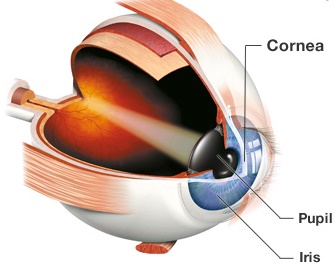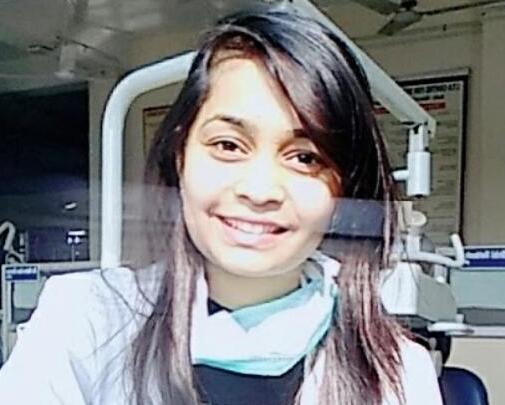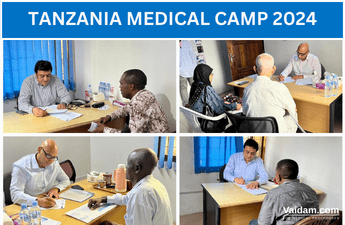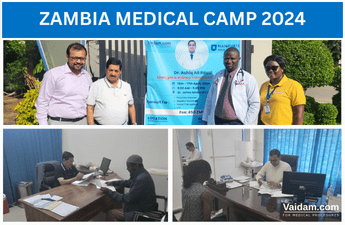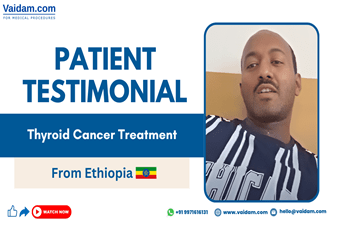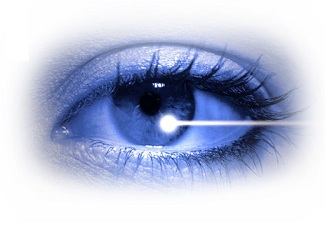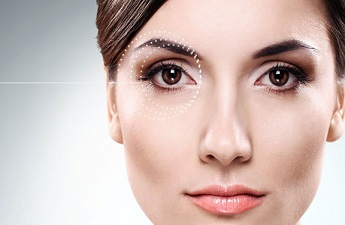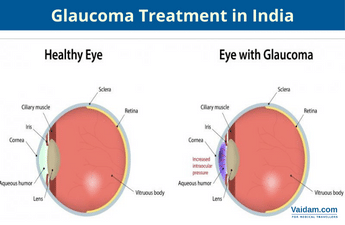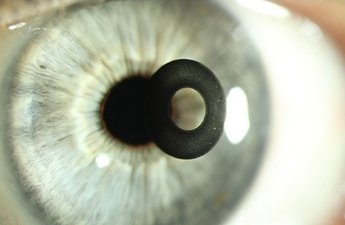WHAT IS CORNEAL TRANSPLANT SURGERY?
Corneal transplant is the removal of a damaged cornea, replacing it with a healthy cornea from the donor. This procedure is also known as Keratoplasty.
Get in Touch with Medical Experts
WHAT IS CORNEA?
The cornea can be illustrated as the front window of the eye which covers the colored iris and round dark pupil. The light that enters is focused while passing through the cornea which helps us to see.
A healthy and a clear cornea are most important for a clear vision. If the cornea is scared, injured or diseased it loses its smoothness and its ability to see clearly causing distorted, glared or blurry vision.
WORK OF CORNEA
Eyes are our organ of sight. It has a number of components which include but are not limited to the cornea, iris, pupil, lens, retina, macula, optic nerve, choroid and vitreous.

Cornea -primarily is responsible for focusing the light in our eyes, it is the clear front surface of the eye, which acts like a camera lens. . The colored iris and the pupil (which is a black dot) can be seen clearly through the cornea. The cornea basically helps to focus the entering light on the retina, which is a light sensitive
film, located at the back of the eye. The picture formed at retina is the passed on to the brain.
However, when the cornea is damaged or diseased it becomes less transparent or can change in shape preventing the light from reaching the retina and transmitting a distorted or an unclear image to the brain.

The iris of the eye functions like the diaphragm of a camera, controlling the amount of light reaching the back of the eye by automatically adjusting the size of the pupil.
Accommodation The eye's crystalline lens is located directly behind the pupil and further focuses light. Through a process called accommodation, this lens helps the eye automatically focus on near and approaching objects similarly like an autofocus camera lens.
Retina Light focused by the cornea and crystalline lens (and limited by the iris and pupil) reaches the retina. The retina acts like an electronic image sensor of a digital camera, converting optical images into electronic signals. The optic nerve then transmits these signals to the visual cortex, the part of the brain that controls our sense of sight.
Know More:
When is a CORNEAL TRANSPLANT necessary?
There are many conditions that can be treated with the help of corneal transplant, some of them are-
-
A cornea that bulges outwards (Keratoconus)
-
Fuchs’ dystrophy – A hereditary condition
-
Thinning of the cornea
-
Cornea scarring, caused by infection or injury
-
Clouding of cornea
-
Swelling of cornea
-
Corneal ulcer
-
Rare complications from previous eye surgery
Corneal Transplant Types
The types of corneal transplant a patient undergoes deepens on the extent of damage and the part of cornea which is damaged. Some of the types of corneal transplant are-
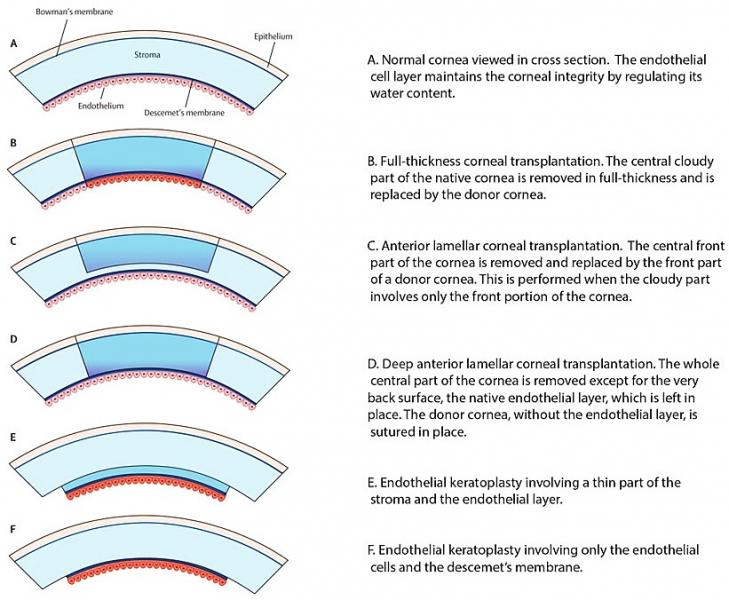
-
Penetrating keratoplasty- A full thickness transplant in which a trephine of an apt diameter is used to make a full-thickness resection of the patient's cornea, followed by placement of a full-thickness donor corneal graft
-
Deep anterior lamellar keratoplasty (DALK) - replacing or reshaping of outer or middle layer of the cornea. It is a partial thickness pro cedure that involves selective transplantation of the corneal stroma.
-
Endothelial keratoplasty- replacing deep layer of cornea. It is relatively a new procedure that involves treatment of disorders of the innermost layer of the cornea. Unlike the traditional corneal transplant, this surgery can be performed with one or no sutures.
BENEFITS OF CORNEAL TRANSPLANT SURGERY
-
It corrects vision to more than 70%
-
Recovery is quick
CORNEAL TRANSPLANT SURGERY PROCEDURE
BEFORE THE SURGERY
-
Prior to the surgery the ophthalmologist will run several eye tests which will determine whether the candidate is fit for corneal transplant surgery or not.
-
A through eye examination- the eye surgeon will make a through eye examination to check any condition which will later cause complications.
-
Measurement of the eye- the doctor will check what size of the cornea is needed by the patient.
-
Review of all the medications and supplements – all the medication will be thoroughly reviewed and the surgeon may advise to stop taking some medicines after or before the surgery.
-
Treatment for other eye problem- infection inflammation etc. must be well treated before the surgery.
-
Information about medical condition- the patient must inform the surgeon about any medical condition or allergy he/she has been suffering from.
-
The patient is required to not eat anything after midnight the night before the surgery. The patient can have water, juice, tea or coffee (without sugar or cream) up to two hour before the surgery. Alcohol must be strictly not consumed since 24hr before the surgery.
-
On the day of surgery wear loose clothes, do not wear ornaments, lotion or cream and make up.
DURING SURGERY
-
Corneal transplant surgery normally takes about an hour to perform under general or local anesthesia.
-
During the most common type of corneal transplant (penetrating keratoplasty), the surgeon cuts the diseased or infected cornea to the entire thickness.
-
A small button shaped disc of the cornea is removed from the eye of the patient.
-
Trephine which is an instrument that acts like a cookie cutter is used to make a précised circular cut in the cornea.
-
The donor’s cornea is cut of the same size to fit the patient’s cornea.
-
Fine nylon stitches are made to hold the graft in place. In case of endothelial keratoplasty air bubble is used instead of nylon to hold the graft in place.
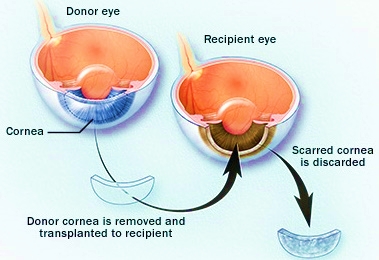
AFTER THE SURGERY
-
Most patients go home on the same day of the surgery but some might have to stay back for a day.
-
The patient will be given eye patches to wear for about 4 days.
-
The doctor will prescribe eye drop to help in quick healing and prevent the eye from infection and rejection.
-
The doctor will remove stitches at a follow up visit. Some stitches might stay up to a year while some may not be removed at all.
RECOVERY
The cornea is considered to be” immunologically privileged” therefore matching of donor to recipient is not required. No Pills and systemic medication is required your eye drops will help to prevent rejection of new cornea. Your body is less likely to reject the transplant if it is done on the outer layer of cornea as compared to the entire layer or inner layer of it. Generally rejection happens in less than 20% of the cases.
CORNEAL TRANSPLANT COMPLICATIONS
The major complications of the corneal transplant are
-
Rejection – the body may reject the transplanted cornea which usually occurs among 1 out of 3 transplanted patients. This rejection may be controlled by steroid eye drops
-
Bleeding
-
Glaucoma
-
Cataract
-
Swelling of cornea
-
Infection of eyes
-
Loss of vision
-
Scarring of eye
SUCCESS RATES OF CORNEAL TRANSPLANT
Success rates generally depend on the problem that needs to be fixed with the help of the transplant. Many researchers have found that new cornea last for at least 10 years in
-
Around 85% of people with keratoconus.
-
Around 75% of people with fushs’ dystrophy.
-
Around 60%-70% of people with corneal scarring.
Outlook (prognosis)
Fully recovery of eye sight may take up to 1 year. Most people with successful corneal transplant have really good vision for many years. The patient may need contact lenses and eye glasses for better vision.
Finding a corneal donor
Most of the cornea which is used for the transplant comes from the deceased donor. Unlike other transplant like kidney, liver or lung the patient for corneal transplant does not have to wait for long time. There are lots of people who request to donate their eye after their death as compared to the other organs. The cornea may not be used from people with several conditions such as central nervous system condition, prior eye surgery or eye infection, other eye condition or people who die of unknown reasons.
FAQ and FACTS
Alternative name
-
Keratoplasty
-
Penetrating Keratoplasty
Does a donor needs to be in best of medical health?
Anyone of age between 2 and 75 can be an eye donor, regardless of his vision or disease likes diabetes, or cancer. The only known recommended conditions where an eye donation cannot occur is HIV, AIDS or Active Hepatitis, Active Syphilis, Rabies, Viral Encephalitis, Leukemia, Active Lymphoma, or Active Meningitis.
How THE CORNEA gets the oxygen?
The cornea gets its oxygen from the air and not from the bloodstream.
REFERENCES

